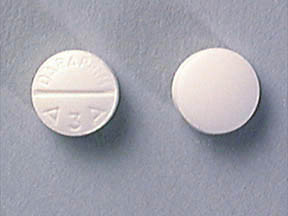PYRIMETHAMINE - ORAL
PHONETIC PRONUNCIATION: (pir-ih-METH-uh-meen)
COMMON BRAND NAME(S): Daraprim
GENERIC NAME(S): pyrimethamine
Uses
USES: This medication is used with other medication (such as a sulfonamide) to treat a serious parasite infection (toxoplasmosis) of the body, brain, or eye or to prevent toxoplasmosis infection in people with HIV infection. Pyrimethamine belongs to a class of drugs known as antiparasitics. It works by killing parasites.
How to use PYRIMETHAMINE - ORAL
HOW TO USE: Take this medication by mouth usually once or twice daily or as directed by your doctor. Take this medication with food to decrease nausea and vomiting. If vomiting is severe or continues, your doctor may lower your dose or direct you to stop taking this medication. Your doctor will prescribe another medication (folic/folinic acid) to prevent blood problems caused by pyrimethamine. Follow your doctor's directions carefully. Drink plenty of fluids to prevent kidney problems if you are taking a "sulfa" medication with pyrimethamine. This medication works best when the amount of drug in your body is kept at a constant level. Therefore, take this drug and other antiparasitic drugs regularly, exactly as prescribed by your doctor. To help you remember, take it at the same time(s) each day. Dosage is based on the type of infection, your medical condition, age, and response to treatment. The length of time you will take this medication depends on your infection. Your dose must be carefully adjusted by your doctor to treat your infection and prevent serious side effects. Follow your doctor's directions carefully. Do not take more or less of this drug than prescribed. Do not stop taking it before completing this prescription unless directed to do so by your doctor, even if you feel better. Skipping or changing your dose without approval from your doctor may cause the amount of parasites to increase, make the infection more difficult to treat (resistant), or worsen side effects. Tell your doctor if your condition persists or worsens.
Side Effects
Precautions
Interactions
Overdose
Images
Reviews
Faq for PYRIMETHAMINE - ORAL
Pyrimethamine is an oral medication that is used to treat or prevent malaria infections, as well as certain types of parasitic infections.
It is usually taken once a week or as directed by your doctor. It is important to take the medication with food or milk to reduce stomach upset. Follow the dosage instructions provided by your healthcare professional.
Common side effects include headache, dizziness, stomach pain, loss of appetite, nausea, vomiting, and diarrhea. If any of these side effects persist or worsen, contact your doctor promptly.
Pyrimethamine should not be used if you have a known allergy to the medication or if you have severe liver disease. It may also interact with certain other medications, so it is important to inform your doctor about all the medications you are taking.
Pyrimethamine should only be used during pregnancy if clearly needed and under the supervision of a healthcare professional. It is not recommended to be used while breastfeeding as it may pass into breast milk and harm the nursing infant.
The exact time for Pyrimethamine to start working may vary depending on the condition being treated. It is important to complete the full course of treatment as prescribed by your doctor, even if you start feeling better.
Using Pyrimethamine for any condition other than what it is prescribed for should be avoided, as it may not be effective and could potentially cause harm. Always consult with your doctor before using any medication for an unapproved use.
If you miss a dose, take it as soon as you remember. However, if it is close to the time for your next dose, skip the missed dose and resume your regular dosing schedule. Do not double the dose to make up for a missed one.
It is generally recommended to avoid alcohol while taking Pyrimethamine. Alcohol can increase the risk of side effects and may also decrease the effectiveness of the medication.
Disclaimer
IMPORTANT: HOW TO USE THIS INFORMATION: This is a summary and does NOT have all possible information about this product. This information does not assure that this product is safe, effective, or appropriate for you. This information is not individual medical advice and does not substitute for the advice of your health care professional. Always ask your health care professional for complete information about this product and your specific health needs.

No Reviews Yet